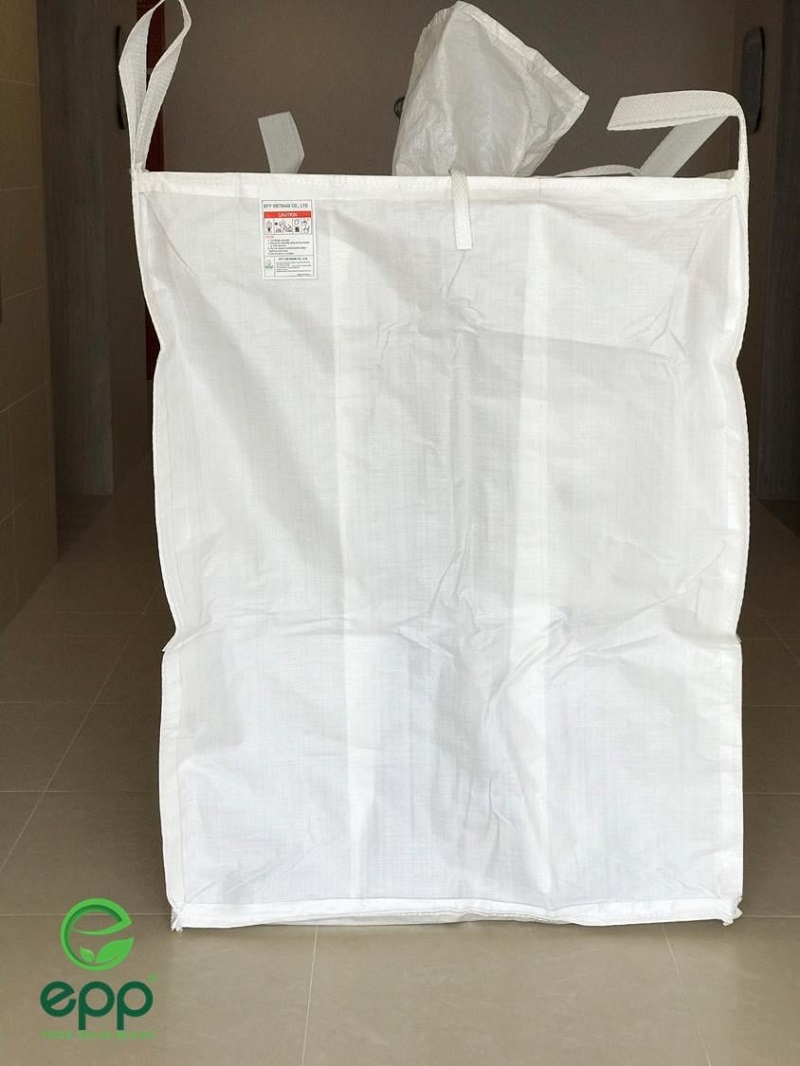What are anti-static FIBC bags and why are they important? That is a question that many people may ask when dealing with this type of packaging. Anti-static bulk bags are large plastic container made from polypropylene woven fabric that is resistant to static electricity.
They are used to pack, transport and store dry goods such as powders, granules, fertilizers, chemicals and other industrial raw materials. In this article, we will learn about this type of packaging with readers.
What is static electricity? What are antistatic FIBC bags?
FIBC (Flexible Intermediate Bulk Container) is also known as jumbo bag, Big Bag, bulk bags... this is a type of packaging used to transport and store powdered goods, granules, pellets, blocks... in bulk.

What is static electricity?
Static electricity is a phenomenon that arises when there is friction between two dissimilar surfaces, creating a high voltage between them. When there is contact between two surfaces of different voltages, an electric current flows, causing sparks or discharges. This can be dangerous to people, equipment and goods especially when working with flammable and explosive goods such as powders, granules or chemicals.
What are antistatic FIBC bags?
Anti-static FIBCs are a type of super sacks specially designed to resist the generation of static electricity. When materials such as plastic particles, powders, chemicals and other materials are transferred in or out of the bag, it can generate static electricity.
This can cause problems such as fire or explosion if not properly controlled. The antistatic jumbo bags is constructed from an antistatic material that eliminates or minimizes static electricity, making it safe to use in potentially hazardous environments.
Types of anti-static FIBC bags are popular on the market
To minimize the risk of static electricity generation, the anti-static big bag is designed with special features. There are some types of FIBC bags:

- Type a fibc: This is a standard FIBC bag, without anti-static feature. They should only be used when there is no source of static electricity generated during the packaging, transportation and storage of the goods.
- Type B FIBC: This is a FIBC bag made from polypropylene woven fabric that minimizes the accumulation of static electricity on the surface of the bag. They can be used where there is a slight source of static electricity during packaging, transportation and storage of goods, but where there is no flammable atmosphere.
- Type C FIBC: This is a bulk bag made from polypropylene woven fabric with metal or carbon yarn woven into it to form a conductive network. They can be used where there is a strong source of static electricity during packaging, transportation, and storage of goods, even in the presence of an explosive atmosphere. However, to be safe, the type C bulk bags need to be properly and continuously grounded.
Frequently asked questions during the use of anti-static FIBC bags
Anti-static FIBC bags are an effective and safe solution for packing, transporting and storing dry goods. Depending on how static electricity is generated and how dangerous your cargo is, you can choose the most suitable FIBC bag for your needs.
1. Can the anti-static FIBC bag be used for all types of goods?
No, anti-static super sacks should only be used for goods that are sensitive to static electricity or in a high-explosion work environment.
2. Can I use standard FIBCs to transport chemical products?
Yes, regular FIBC bags can be used to transport chemical products that are not sensitive to static electricity in environments where there is no risk of explosion.
3. Is the anti-static FIBC bag more expensive than the regular FIBC bag?
The choice between anti-static FIBC bags and standard FIBC bags depends on the specific requirements of each application. If the work environment has a high risk of fire or explosion or the goods are sensitive to static electricity, an anti-static bags like type D big bags or type C conductive jumbo bags may be a safer choice. However, in environments where there is no risk of fire and explosion and with goods that are not sensitive to static electricity, a standard FIBC bag may be a more economical and convenient option.
4. Does the antistatic FIBC bags comply with international antistatic standards?
Yes, antistatic FIBC bags generally comply with international antistatic standards, including IEC 61340 and CENELEC CLC/TR 50404. Compliance with these standards ensures that electrostatic FIBC bags have been tested and confirm compliance with anti-static regulations, while ensuring a level of safety for users.
5. What precautions should I take when using antistatic FIBC bags?
When using antistatic FIBC bags, the instructions and regulations given by the manufacturer and the relevant standards should be followed. This includes the use of grounding devices to minimize electrostatic properties and avoid the accumulation of static electricity during handling and transportation. It is important to ensure that the anti-static bulk bags are used correctly to ensure maximum performance and safety.
With detailed information and specific examples, hopefully, this article has helped you better understand the anti-static FIBC bags to choose the right product for your applications. Please contact us for advice and supply of high quality and reasonable price antistatic jumbo bags.
🌐 Address: Central Lake 1 Building, Aqua Bay, Ecopark, Phung Cong Commune, Van Giang, Hung Yen.
🌐 Website: https://epp.vn - https://eppvietnam.trustpass.alibaba.com
📲 +84 986 002 888 - sales@epp.vn.



